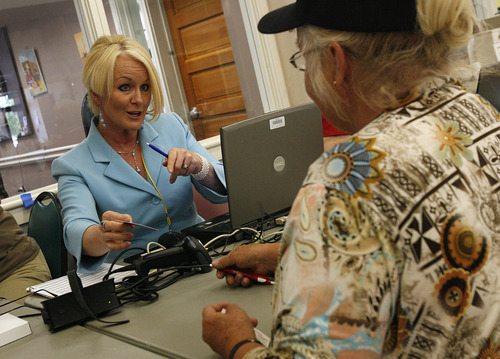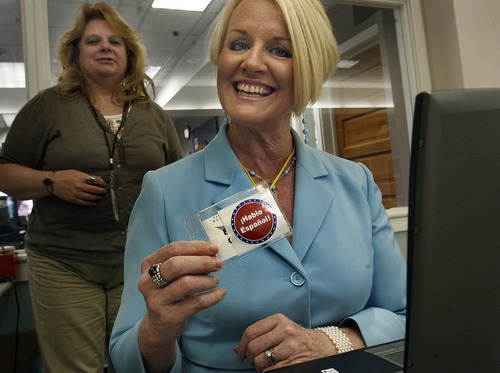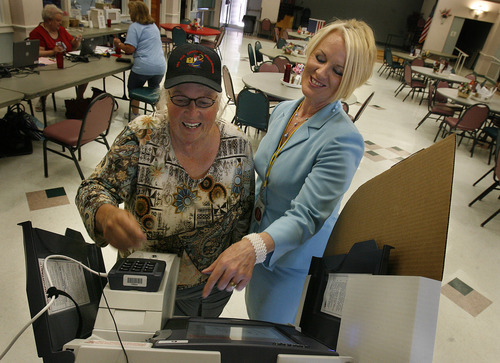This is an archived article that was published on sltrib.com in 2012, and information in the article may be outdated. It is provided only for personal research purposes and may not be reprinted.
Blythe Carlsen has a degree in Spanish translation.
Aida Shepherd teaches Spanish at Judge Memorial Catholic High School.
But on Tuesday, for the primary election, they will be among 127 bilingual workers stationed at selected polling places to help the Salt Lake County Clerk's Office comply with a federal mandate to help Spanish-speaking voters cast ballots.
"Not only will we have bilingual poll workers at those polling places," said County Clerk Sherrie Swensen, "but we'll have people [in the main office] to take calls from anyone needing assistance."
This is the first election in which the county is required, under the federal Voting Rights Act, to provide ballots, voter information and voting assistance in Spanish.
The mandate was driven by 2010 U.S. Census Bureau data that showed portions of the county have a sizable number of residents (more than 5 percent) who do not speak English well enough to vote knowledgeably without language assistance.
After being notified of the requirement in October by the Justice Department, Swensen's office began the laborious task of complying.
At least 50 documents — ballots, voter registration forms, vote-by-mail applications, polling location notices, absentee ballot envelopes, to name just a few — had to be provided in Spanish as well as English.
Swensen's staff also identified 107 voting precincts, out of 724 countywide, that would need bilingual poll workers. Some of the county's 320 polling stations needed two workers with Spanish-language skills, increasing the size of the bilingual force to 127.
"It took some time and recruitment efforts," Swensen said, especially since some bilingual workers were needed for the past two weeks when early voting took place at 21 polling places in the county.
Carlsen, a Taylorsville resident, spent the last fortnight at the Eddie P. Mayne Kearns Seniors Center, teaming up with Gae Lyn DeLand and Paula Hammon. She hasn't been terribly busy but has had a few occasions to use Spanish-language skills gained from schooling and several years of living in Puerto Rico.
"We had a lady in here from Mexico, and she had some questions about who was running. She knew a little about the presidential election, but not much about anybody else," Carlsen said.
"We couldn't really help her with that because we're Switzerland," she joked, referring to the country long known for its neutrality. "I told her places where she could find information. She decided to check that out before she voted so she could be more educated."
Shepherd jumped at the chance to get involved as the early-voting season starting shortly after the school year ended. She spent the early-voting period at the polling station in the County Government Center.
"We've had a few people come in, but not quite as many as I would have thought," she said. "Mostly I explained the different ballots, how the primaries work. One man came in and needed some assistance filling out a provisional ballot. He just didn't know a lot of English, so it was nice to have somebody there to explain it all to him."
Swensen said she has received a number of complaints from people upset about receiving election information in English and Spanish. Some but not all were satisfied with her explanation that it is required by the Voting Rights Act, passed by Congress in 1975 and renewed three times after that.
The 2010 census put the county's Latino population at 176,015 — 17.1 percent of the total — an increase of 65 percent from the previous decade.
mikeg@sltrib.comTwitter: @sltribmike —
Tuesday's primary
P Vote from 7 a.m. to 8 p.m. Find your polling place at vote.utah.gov/elections/location







